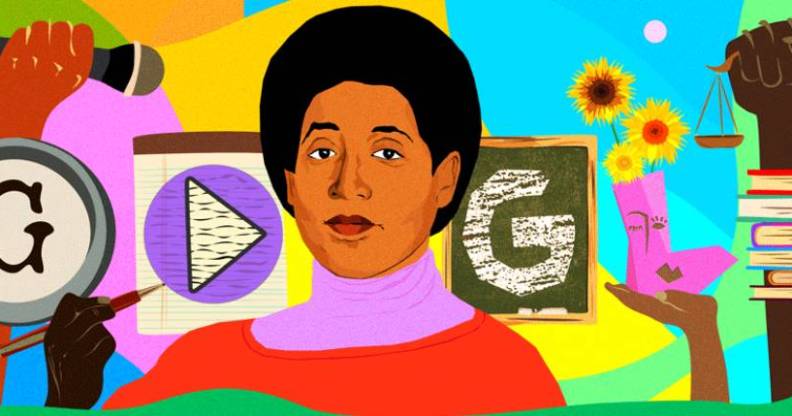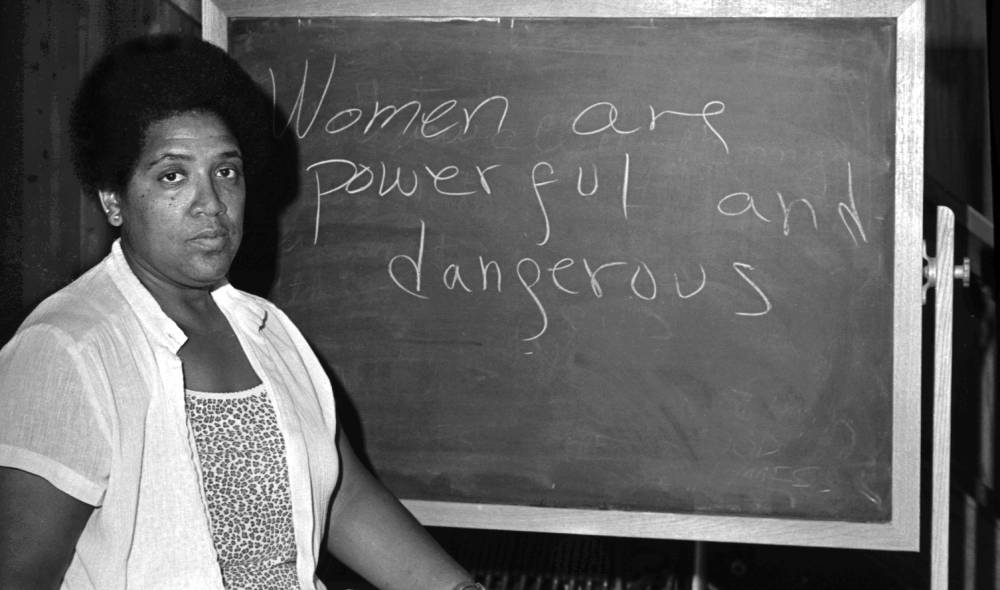Remembering Audre Lorde – the legendary Black, lesbian, mother, warrior poet who changed the world

Google celebrates acclaimed poet Audre Lorde for Black History Month. (Google)
Audre Lorde would have celebrated her 87th birthday Thursday (18 February).
The self-described “Black, lesbian, mother, warrior poet” is best known for writings reflecting her hatred of racial and sexual prejudice. She dedicated her life and creative works to confronting and addressing social injustices including racism, homophobia, sexism, classism and capitalism.
Almost three decades after her death, Lorde continues to be rightly celebrated for her artistry and civil rights activism.
Among those to pay tribute on Audre Lorde’s 87th birthday include Nancy Pelosi, who lauded her work forging “a coalition across race, gender, sexual orientation, class, ability and age to push back against society’s tendency for categorisation”, and author Mona Eltahawy, who tweeted a quote from Lorde herself: “No woman is responsible for altering the psyche of her oppressor, even when that psyche is embodied in another woman.”
Google is also honouring Lorde, replacing its logo with a special “Google Doodle” illustrated by Los Angeles-based artist Monica Ahanonu as part of its ongoing Black History Month celebrations.

Audre Lorde, writer feminist, poet and civil-rights activist, during her 1983 residency at the Atlantic Center for the Arts in New Smyrna Beach, Florida. (Robert Alexander/Getty)
Audre Lorde: ‘I used to speak in poetry.’
Audre Lorde was born in New York City on 18 February 1934 to West Indian immigrant parents. She attended Catholic schools before graduating from Hunter High School and published her first poem in Seventeen magazine while still a student there.
Lorde told Black Women Writers about her beginnings as a poet. She said: “I used to speak in poetry.
“I would read poems, and I would memorise them.
“People would say: ‘Well what do you think, Audre?’
“And I would recite a poem, and somewhere in that poem would be a line or a feeling that I would be sharing.
“In other words, I literally communicated through poetry.
“And when I couldn’t find the poems to express the things I was feeling, that’s what started me writing poetry, and that was when I was 12 or 13.”
‘I have a duty to speak the truth.’
Lorde went on to get a bachelor’s degree from Hunter College and a masters in library sciences from Colombia University. She worked as a librarian in the New York public schools system throughout the 1960s.
Audre Lorde had two children with her husband Edward Rollins, a white, gay man, but the two divorced in 1970. In 1972, she met her long-time partner Frances Clayton.
Lorde’s early collections of poetry include The First Cities (1968), Cables to Rage (1970) and From a Land Where Other People Live (1972), which was nominated for a National Book Award. Later works like New York Head Shop and Museum (1974), Coal (1976) and The Black Unicorn (1978) included powerful poems of protest.
Lorde once said: “I have a duty to speak the truth as I see it and to share not just my triumphs, not just the things that feel good, but the pain, the intense, often unmitigated pain.”
Her work is central to many liberation movements including civil rights, Black cultural movements, LGBT+ equality and feminism.
Audre Lorde’s prose and poetry.
Lorde was also a noted prose writer as well as a poet. Her The Cancer Journals (1980) shared her struggles to overcome breast cancer and mastectomy and is regarded as a major work of illness narrative. But in 1984, she found out her breast cancer had metastasised in her liver.
From 1991 until she died in 1992, she was the New York state poet laureate. When designating her as such, the then-governor Mario Cuomo said: “Her imagination is charged by a sharp sense of racial injustice and cruelty, of sexual prejudice…
“She cries out against it as the voice of indignant humanity.
“Audre Lorde is the voice of the eloquent outsider who speaks in a language that can reach and touch people everywhere.”
In 1992, she received the Bill Whitehead Award for Lifetime Achievement from Publishing Triangle. In 2001, Publishing Triangle instituted the Audre Lorde Award to honour works of lesbian poetry.
Lorde died of breast cancer at the age of 58 on 17 November 1992 in St Croix, where she had been living with Gloria I Joseph.

